Wednesday Feb 18, 2026
Wednesday Feb 18, 2026
Saturday, 6 November 2021 00:10 - - {{hitsCtrl.values.hits}}
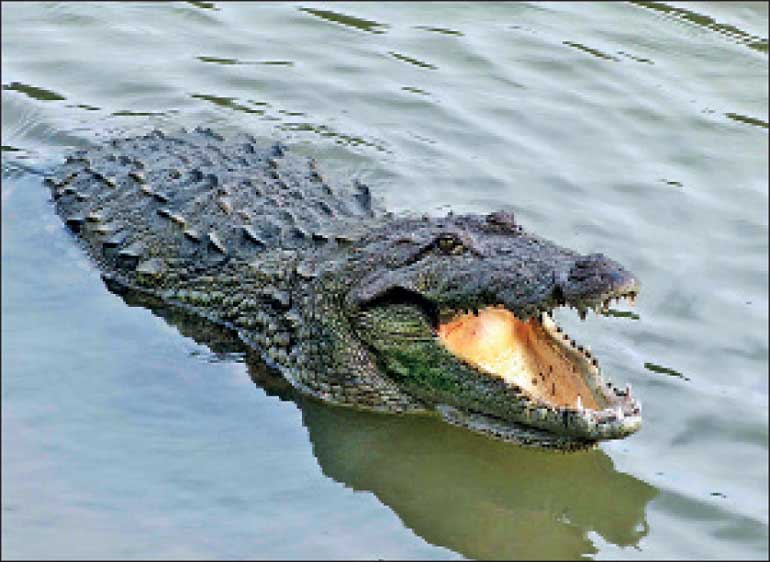
How and when she arrived at the hotel is rather vague, but Sunela Jayawardene, the architect of the hotel, recalls sighting her during the construction time as a very young juvenile, which indicates that she’s been around the hotel and made it her home for about 17 years
 Vil Uyana, the iconic, award-winning, luxurious boutique hotel, set amidst purpose built wetlands and thriving natural environment, celebrated its 15th anniversary of operations last week. And what better anniversary gift than to have their resident crocodile ‘Villy’ produce a brood of hatchlings almost to the day, for the first time ever. The mother and 16 babies (up to now) are reportedly doing fine.
Vil Uyana, the iconic, award-winning, luxurious boutique hotel, set amidst purpose built wetlands and thriving natural environment, celebrated its 15th anniversary of operations last week. And what better anniversary gift than to have their resident crocodile ‘Villy’ produce a brood of hatchlings almost to the day, for the first time ever. The mother and 16 babies (up to now) are reportedly doing fine.
The story of Villy the crocodile, and Vil Uyana the hotel, are both most interesting.
The hotel
Vil Uyana was the brainchild of Jetwing Chairman Hiran Cooray, who conceptualised it around the London Wetlands Centre. A barren patch of land in Sigiriya was carefully nurtured and developed into a wetland and thriving ecosystem of its own. Part of the area was reforested, and another section developed for paddy cultivation using traditional methods.
Twenty-five individual luxurious chalets were built initially, spread over the property. Over time a range of fauna were attracted to the salubrious natural environment of the hotel premises.
According to the hotel, after operations commenced, mammals species have increased from 12 to 27, birds from 29 to 151, butterflies from 24 to 51, and amphibians and reptiles from three to 39.
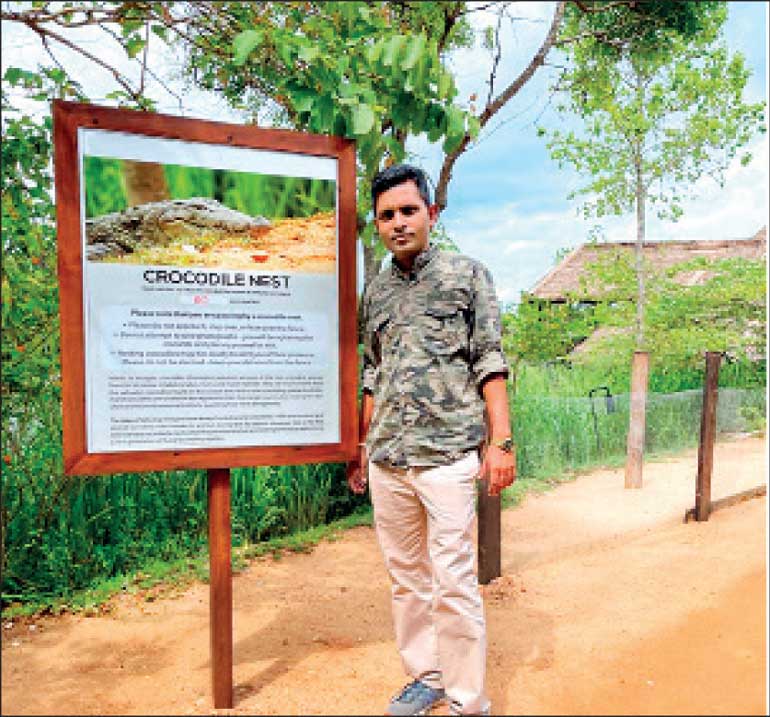
The hotel had noticed that there were stray dogs and land monitors trying to raid the nest, so a security guard was instructed to check on the nest every hour around the clock; the nest area was also cordoned off, leaving access for Villy to enter
The first northern Grey Slender Loris, an elusive nocturnal primate, was glimpsed in a forest patch at the resort in 2010. Prompt action by Jetwing’s management saw development plans for the forest patch shelved, and the area comprising rich vegetation was declared as Jetwing Vil Uyana’s Loris Conservation site. Today it has become world famous for its Loris conservation efforts (that’s a story of its own).
The hotel went on to win several local and international awards, particularly for its design which incorporated the environment. Today it is arguably Sri Lanka’s most well-known luxury nature -boutique hotel.
Villy the crocodile
I first set eyes on Villy around 2007 when I stayed in the hotel with my family. We christened her ‘Villy’ at that time. Since then I have followed her ‘progress,’ dropping in to the hotel whenever I was travelling in the area.
She was a mugger or marsh crocodile (Crocodylus porosus) and must have been about three or four old at that time and was about 2.5 feet (about 3-4 metres) long. We saw her basking in the sun at the further end of the pool, and she was the cynosure of all the resident tourists (actually none of us were really aware of her sex until last week, so now that we know, I will refer to Villy as ‘her’!).
How and when she arrived at the hotel is rather vague, but Sunela Jayawardene, the architect of the hotel, recalls sighting her during the construction time as a very young juvenile, which indicates that she’s been around the hotel and made it her home for about 17 years. Assuming that she was around two-and-a-half-years old when first sighted, I would estimate that she’s about 19-20 years now. In all her 17 plus years at the hotel, there has never been any altercation with guests or staff, although she has been sighted quite close and out in the open several times.
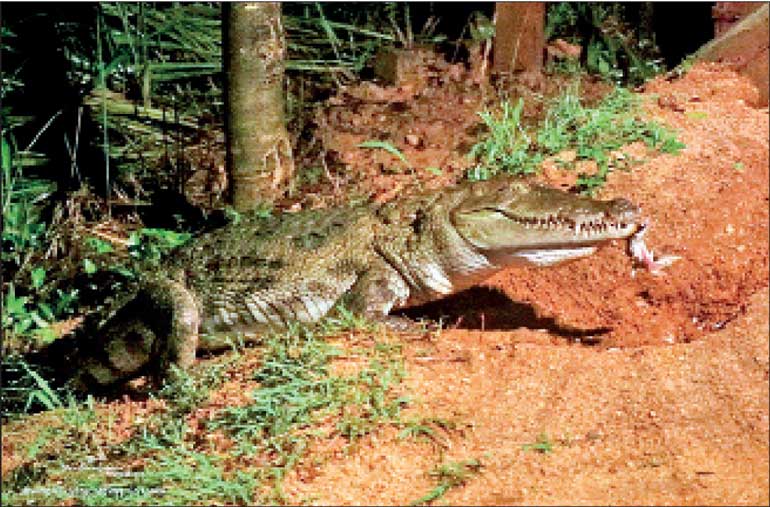
Villy delicately carried the new-born hatchlings in her mouth to the edge of the bund, closer to the water’s edge; some were finding it difficult to break open their shells and those she gently broke open with her mouth
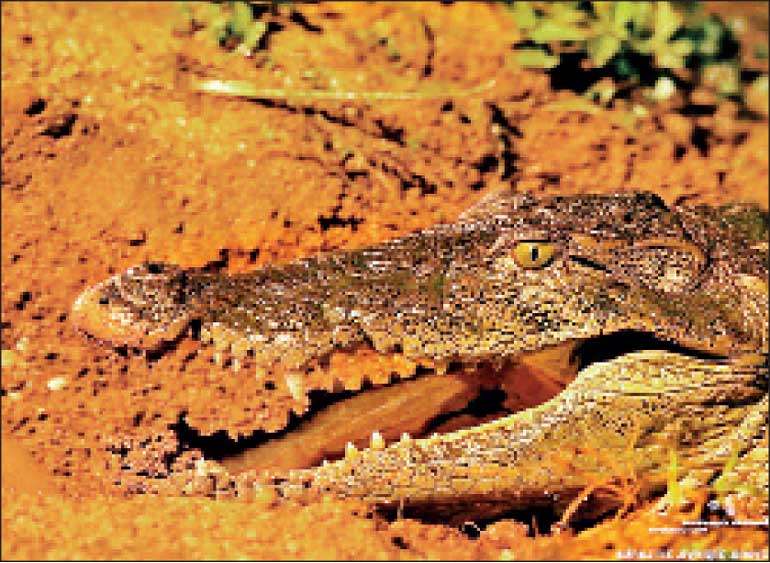
Over two months ago Experiential Manager Chaminda Jayasekara had noticed some strange behaviour from Villy – she was found digging the soil by the roadside a few metres away from the restaurant and once she had uncharacteristically hissed at him
There is an interesting incident on record when during the early days the Department of Wildlife and Conservation ‘raided’ the hotel on the suspicion that the hotel was keeping a tame crocodile in the premises. Inspection revealed the truth, that the crocodile had taken up residence in the hotel premises on its own accord, and that the hotel had not done anything to encourage it. It was obvious that the environment had become so ‘natural’ that wild animals were being attracted to it.
On a few occasions Villy has gone on a ‘walkabout’ and had been missing for a few days from the hotel premises. Usually during periods of drought, crocodiles travel overland in search of water holes. But in the hotel premises there was always adequate water and food ( fish in the water bodies). So Villy has been content to live in the hotel premises, by and large without causing any problems to anyone, except for such short ‘excursions’ occasionally.
There are records of at least four other crocodiles making periodic visits to the hotel premises during the dry season and making it their temporary home. And obviously one of these ‘visitors’ must have turned suitor to Villy, culminating in her becoming a mother for the first time.
The birth
Most of the following is based on discussions I had with Experiential Manager of the hotel, Chaminda Jayasekara.
Over two months ago Chaminda had noticed some strange behaviour from Villy. She was found digging the soil by the road side just a few metres away from the restaurant and on one occasion she had very uncharacteristically hissed at him when he was walking along the road.
A few days later he had noticed that she had dug up a small area, and covered it up with soil. So when she was not around, he had carefully removed the top soil and found a clutch of eggs buried there. Thrilled with the discovery, he had quickly replaced the soil over the ‘nest’. Subsequently the hotel staff had noticed Villy spending long periods at the nest, obviously guarding it.
Chaminda told me that he was surprised that she had chosen that particular spot, only about five metres away from the restaurant, right by the side of a road that was often used by guests and staff. We both surmised that maybe she trusted the hotel (her home for almost two decades) and humans, and felt more confident to nest closer to humans.
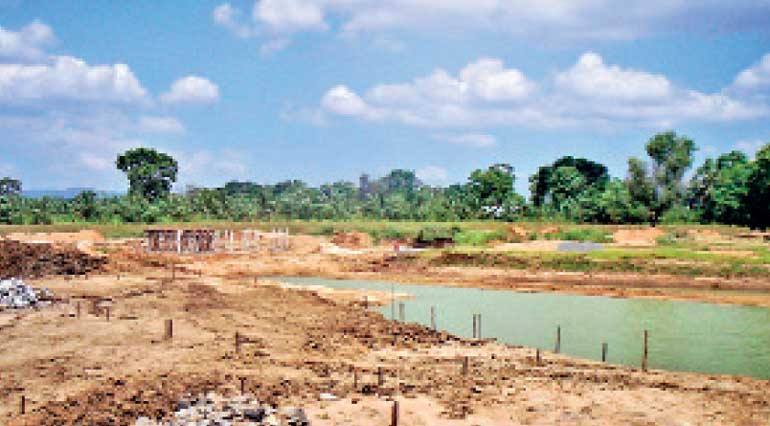
Vil Uyana was the brainchild of Jetwing Chairman Hiran Cooray, who conceptualised it around the London Wetlands Centre. A barren patch of land in Sigiriya was carefully nurtured and developed into a wetland and thriving ecosystem
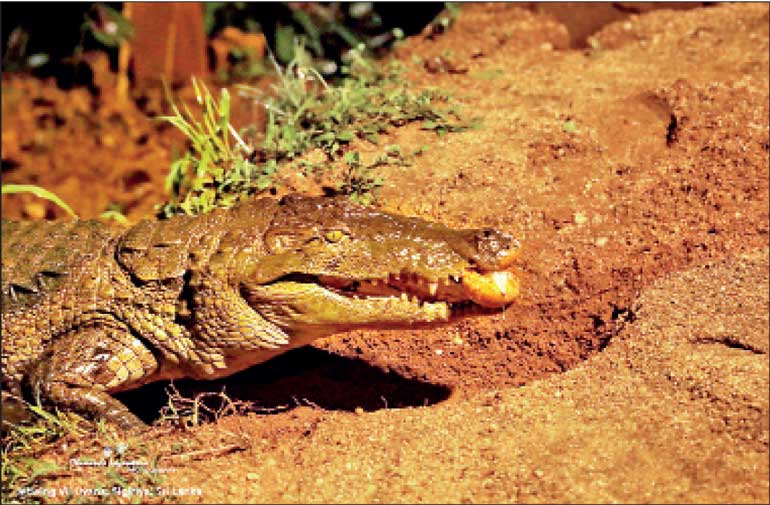
About 70 days later (the typical incubation period of crocodiles being about 80 days) Villy had started digging the nest and exposing the eggs; Chaminda and his team could hear the babies making chirping noises inside the eggs
The hotel had noticed that there were stray dogs and land monitors who were trying to raid the nest, so a security guard was instructed to check on the nest every hour around the clock (a typical response one would expect from this hotel, which places such a great value on conservation of nature and the environment). The nest area was also cordoned off with a wire netting, leaving access for Villy to enter from the side.
After about 70 days (the typical incubation period of crocodiles being about 80 days) Villy had started digging the nest and exposing the eggs. Chaminda and his team could hear the babies making chirping noises inside the eggs, as they started breaking out of their shells. Villy very delicately carried the new-born hatchlings in her mouth to the edge of the bund, closer to the water’s edge.
Some were finding it difficult to break open their shells, and those she gently broke open with her mouth. Chaminda tells me it was amazing to see such a massive animal with such powerful jaws, being so gentle [a crocodile can slam its jaws shut with a force of some 3,700 pounds per square inch (psi) or 16,460 newtons of bite force. By contrast, you might tear into a steak with 150 to 200 psi (890 newtons). Hyenas, lions, and tigers generate around 1,000 psi (4,450 newtons).
Interestingly Chaminda told me that on finding one egg rotten and smelling, Villy had eaten the whole egg immediately. She would eat up all the shells and the remains of the placenta, perhaps to remove all residual smell which may attract predators.
By late morning all the hatchlings were closer to the bank near the water, basking in the sun, while the ever-vigilant mother kept a close eye over them. As of writing, there are 16 hatchlings alive and well. The team is not sure whether there are any more eggs remaining to hatch.
The challenge would be to now protect the hatchlings from numerous predators. Granted that within the hotel premises such threats would be less than in the wild. In the wild the survival rate is very low (around 20%) and I am sure that the Vil Uyana team will zealously safeguard the family.
Chaminda and I discussed what would happen when eventually the hotel would have a large crocodile population to deal with! I guess nature will take its course. Demand on limited resources will put pressure on individuals, who will then move off to find other locations.
Meanwhile, as the hatchlings slowly grow up, I am sure Jetwing and Vil Uyana team will have great happiness and a sense of achievement. This is certainly further confirmation that the fruits of their efforts have succeeded in creating a thriving natural oasis of an ecosystem, amidst a star class hotel development.
(Pix courtesy Chaminda Jayasekara)
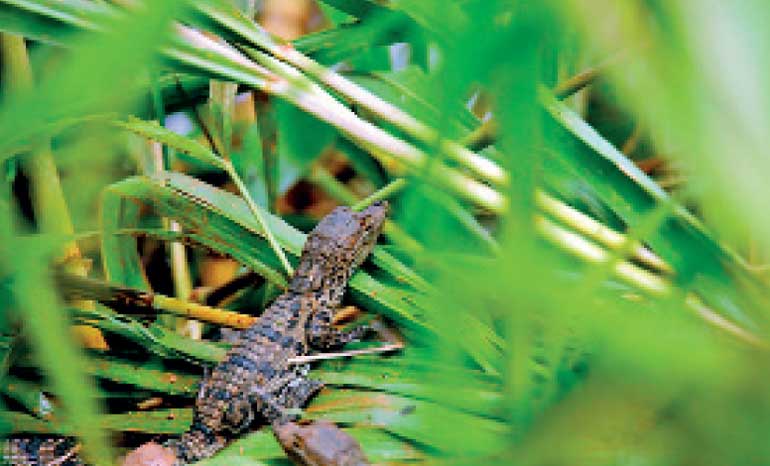
By late morning all the hatchlings were closer to the bank near the water, basking in the sun, while the vigilant mother kept a close eye over them. As of writing, there are 16 hatchlings alive and well, the team is not sure whether there are more eggs
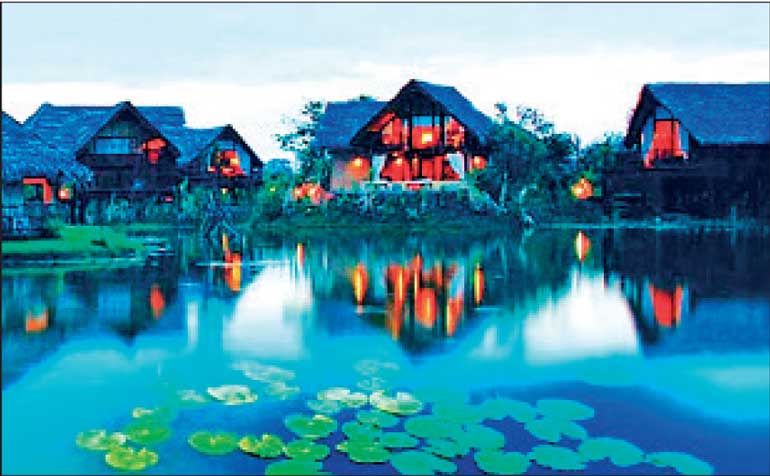
Twenty-five individual luxurious chalets were built initially, spread over the property. The hotel went on to win several local and international awards, particularly for its design which incorporated the environment